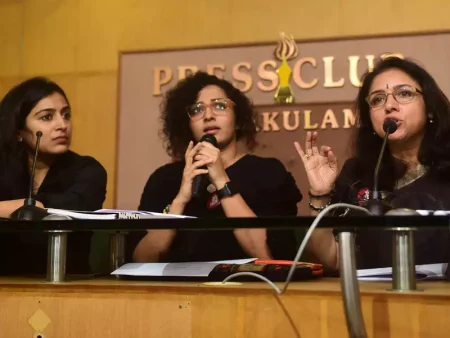The Hema Committee Report: In the witness account, it was revealed that the actress had to act alongside a man who had previously abused her. The producer criticised her performance without understanding the mental trauma she was going through.
Following the 2017 sexual assault of a prominent Malayalam actress, the Kerala government established a three-member commission to investigate the issues facing women in the Malayalam film industry. The commission was chaired by retired Justice K. Hema, with former bureaucrat K. B. Valsalakumari and veteran actress Sharada as members. The commission submitted its report to the Kerala government in December 2019. However, the report was only made public after a delay of four-and-a-half years.
Findings of the Justice Hema Committee Report
The Justice Hema Committee report provides a detailed account of the challenges encountered by women working in the Malayalam film industry. Key areas of concern identified in the report include:
- Sexual Harassment: The report highlights the prevalence of sexual harassment within the industry.
- Lack of Basic Facilities: It points out deficiencies in essential amenities such as women’s toilets and changing rooms.
- Gender Bias and Discrimination: The report addresses issues related to gender inequality and discriminatory practices.
- Disparity in Remuneration: It discusses the unequal pay between male and female actors.
- Absence of Legal Recourse: The report notes the lack of a legally-constituted body to address and resolve grievances.
Notable Revelations
One of the significant revelations from the report involves a female actor’s traumatic experience. According to her account, she was required to act alongside an actor who had previously sexually assaulted her. They were cast as a married couple, and she was compelled to perform intimate scenes with him. The psychological and physical strain from this situation made it difficult for her to complete her scenes. The report describes how her discomfort was apparent during filming, but instead of understanding her distress, the filmmaker reportedly criticized her for taking multiple takes.
Industry Attitudes and Challenges
The report also addresses the pervasive attitude within the industry that women are merely seeking fame and financial gain. It suggests that some men in the industry mistakenly believe women will tolerate any behavior to secure roles. This perception overlooks the genuine passion and dedication many women have for their craft.
Furthermore, the report reveals that women who raise complaints about abuse are often labeled as troublemakers and face ostracism. This social stigma exacerbates their suffering and discourages others from speaking out. The committee found that many women endure hardships in silence due to fear of repercussions and the threat of being branded as problematic.
Documentation and Evidence
The report is based on witness testimonies, including oral statements, WhatsApp messages, audio and video clips. It also highlights the impact of cyberbullying and trolling, which further discourages women from coming forward with their complaints. The report’s findings underscore the harsh realities faced by women aspiring to work in the film industry, including issues related to the casting couch.
Conclusion
The Justice Hema Committee report sheds light on the severe issues faced by women in the Malayalam film industry, offering a stark portrayal of their struggles and the systemic problems that perpetuate these challenges.


